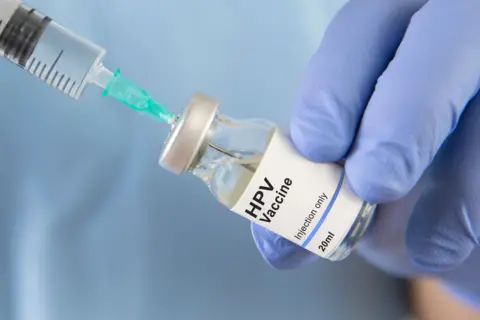6,500 amputations in Brazil in a decade

Via Luis Barrucho, BBC World Service
 Getty
GettyIn 2018, Mr. João, a Brazilian pensioner, sought medical help after discovering a wart on his penis.
“I started going to medical clinics to find out what it was, but all the doctors told me it was due to excess skin and prescribed medication,” the 63-year-old man recalls. .
Even though I took medication, the warts continued to grow. It begins to affect his marriage and João and his wife’s sex life declines. “We are like siblings,” he admitted. He was determined to find out what was going on.
For five years, João, not his real name, saw specialists for more medication and a new biopsy. “Nothing solves it,” he said.
Then, in 2023, he was diagnosed – João had penile cancer.
“For my family, it was a very unpleasant surprise, even more unpleasant because I had to have part of my penis removed. I felt like I had been beheaded,” he said.
“It’s a type of cancer that you can’t tell people about because it might become a joke.”
Penile cancer is rare but incidence and mortality are increasing worldwide.
According to the latest studies, João’s home country, Brazil, has the highest incidence of the disease with 2.1 per 100,000 men.
‘Scared of surgery’
According to the Brazilian Ministry of Health, from 2012 to 2022, there have been 21,000 reported cases. This has resulted in more than 4,000 deaths and over the past decade there have been more than 6,500 amputations – an average of one every two days.
Maranhão, the poorest state in Brazil, was found to have the highest incidence rate globally at 6.1 per 100,000 men.
Symptoms of penile cancer often begin with ulcers on the penis that do not heal and a strong-smelling discharge. Some people also experience bleeding and changes in the color of the penis.
When detected early, the chance of recovery is high through treatments such as surgical removal of the lesion, radiotherapy and chemotherapy.
But if left untreated, partial or total amputation of the penis and possibly other nearby sexual organs such as the testicles may become necessary.
João had a partial amputation in January and said it was a difficult time.
“It’s something you never imagine will happen to you and when it does, you can’t go around telling people,” he said.
“I was very afraid of surgery but there was no other way. The feeling in the first weeks after surgery was sadness, I couldn’t deny it. Not having part of my penis was horrible.”
Some patients require a total amputation, which is life-changing.
“In the case of partial amputation, urine continues to escape through the penis,” said Thiago Camelo Mourão from the Department of Urology at the AC Camargo Cancer Center in São Paulo.
“However, in cases of total amputation, the urethral opening may be moved to the perineum, between the scrotum and anus, causing the patient to urinate while sitting on the toilet.”
 SBU
SBUInfection with human papillomavirus (HPV), the name given to a common group of viruses, is “one of the main risk factors,” said Mauricio Dener Cordeiro of the Brazilian Urological Association. HPV can be transmitted during sex and in some cases it can lead to cancers including oral and penile cancers.
Mass HPV vaccination is essential because it is highly effective in preventing associated lesions, he said, but he added that vaccination rates in Brazil are lower than needed to actually effective.
“In Brazil, despite the availability of vaccines, HPV vaccination rates remain low for girls – reaching only 57% – and for boys, the rate does not exceed 40%,” he said. 90%.”
He believes misinformation about the vaccine, unfounded doubts about its effectiveness and a lack of vaccination campaigns have contributed to low take-up rates.
According to the UK’s National Health Service (NHS) website, smoking can also increase the risk of penile cancer. It also says you’re more likely to get penile cancer if you “have problems pulling back the foreskin (the layer of skin that covers your penis) to keep your penis clean (a condition called is phimosis).
“When a man does not expose his glans and does not clean his foreskin properly, it creates a buildup of secretions,” says Dr. Cordeiro. “This creates a very favorable environment for bacterial infection.
“If this happens repeatedly, it becomes a risk factor for the appearance of tumors.”
 beautiful images
beautiful imagesBut Brazil isn’t the only place where penile cancer is on the rise. According to the latest research, the number of cases is increasing worldwide.
In 2022, the journal JMIR Public Health and Surveillance published the results of a large-scale analysis involving the latest data from 43 countries.
It found the highest incidence of penile cancer between 2008 and 2012 was in Uganda (2.2 per 100,000), followed by Brazil (2.1 per 100,000) and Thailand (1.4 per 100,000). 100,000). The lowest was in Kuwait (0.1 per 100,000).
The research team led by Leiwen Fu and Tian Tian from Sun Yat-Sen University in China said: “Although developing countries still have higher incidence and mortality rates from penile cancer, the The incidence of this disease is increasing in most European countries.
They reported that the UK has seen an increase in the incidence of penile cancer, increasing from 1.1 to 1.3 per 100,000 between 1979 and 2009, and in Germany cases increased 50% from 1.2 to 1.8 per 100,000 between 1961 and 2012.
According to the Global Cancer Registry’s prediction tool, these numbers are only set to get higher. It is estimated that by 2050, the global incidence of penile cancer will increase by more than 77%.
According to experts, this change can largely be attributed to the aging population. The highest incidence occurs in men in their 60s.
“Penile cancer is a rare disease but also highly preventable,” said Dr. Cordeiro.
He advises that using condoms during sex and surgically removing the foreskin in cases of foreskin infection can help reduce the risk of penile cancer.
Neil Barber, Clinical Lead in Urology at Frimley Health NHS Foundation Trust, added: “Penile cancer is almost unheard of in circumcised men. Poor hygiene and infection below the foreskin glans, as well as conditions such as phimosis that make retraction of the foreskin difficult and maintaining good hygiene are risk factors. This is associated with a higher overall risk of infection “.
“Identified risk factors also include unsafe sex, especially not using condoms, and poor hygiene further increases the risk through this route.”
João is currently waiting for the latest test results, which he will receive later this year. “I am confident that these tests will show that I will recover,” he said.
“Now, after the amputation, the pain is gone and I feel much better. But I will have to live with a partially amputated penis for the rest of my days.”
According to Cancer Research UKMore than 90% of men diagnosed with penile cancer that has not spread to nearby lymph nodes will survive 5 years or more.
Additional reporting by Rone Carvalho, BBC Brasil





